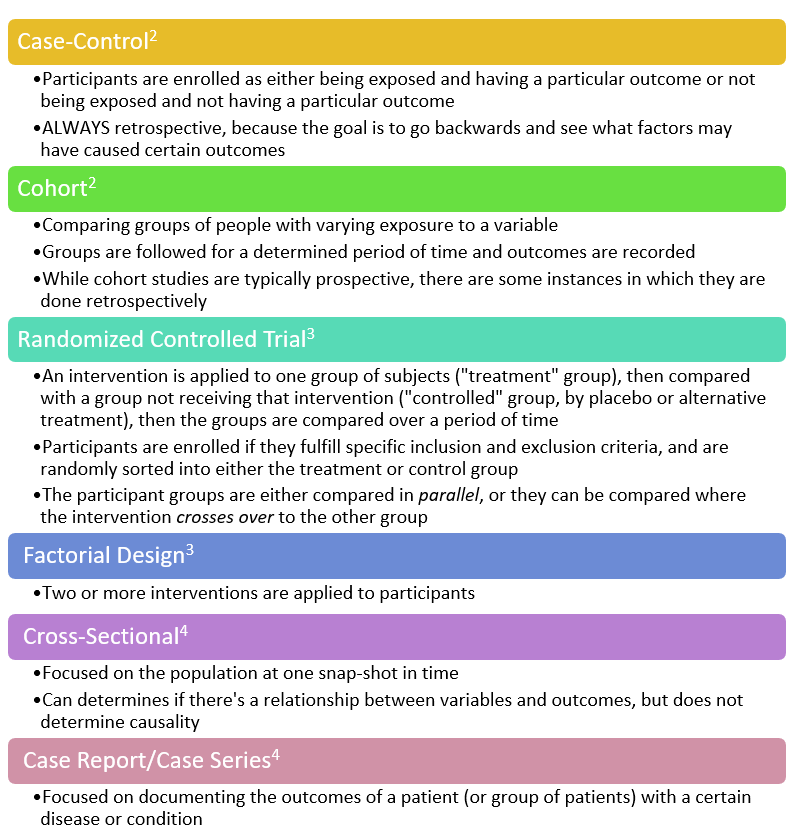In healthcare, collaboration and the sharing of information is vital to the expansion of knowledge. Different types of studies are conducted to confirm or build upon key concepts, such as the efficacy of a drug, the safety of an intervention, or the superiority of a specific treatment. In this blog, we will briefly review different study types that are used to answer clinical questions in the healthcare setting.
Quantitative studies1
Clinical guidelines are based upon evidence-based medicine (EBM), which is primarily derived from quantitative studies. Quantitative studies can either be descriptive or analytical.
A descriptive study does not try to establish a relationship between variables, and instead, simply describes the data that was found. Descriptive studies include case reports and case series.
An analytical study tests a hypothesis in a group of people to determine if there is a specific cause or relationship between variables. A hypothesis can be tested one of two ways: through the use of an intervention (an experimental study) or by observing the effect without directly applying an intervention (an observational study). Analytical studies include case-control, cohort, or randomized controlled studies, as well as those of a factorial design.
Below the different subtypes of studies are summarized.

Some studies pool together information from a variety of quantitative studies. Meta-analyses focus on pooling data to conduct further statistical analyses with increased power to support conclusions5. Forest plots are a tool typically utilized by meta-analyses. A systematic review focuses on answering a clinical question by summarizing data from other studies, without doing a separate statistical analysis5.
Qualitative studies6
While quantitative research is needed to justify consensus for EBM, qualitative studies are a major component of health care practice, particularly in the fields of academia and community health. If you are part of a non-profit organization looking to apply for grant funding, qualitative data can help to justify the needs of your population of interest.
The methodology of qualitative studies is based upon the information needed.
| The _________ qualitative method… | asks the question(s)… |
| Phenomenology | How do people experience a certain event? |
| Grounded theory | What is the theoretical framework for a particular behavior, thought process, etc.? |
| Ethnography | What are the important cultural aspects of a particular community? |
| Historical | How can the past events affect the future for this group? |
| Narrative inquiry | What are the unique perspectives or lived experiences of this specific (often marginalized) group of people? |
| Action research | What approach does this specific (often marginalized) group of people propose for addressing groups like themselves? How can we get this group involved in the process? |
| Case study | What is the experience of a particular entity (individual, community, organization, etc.)? |
Methods for achieving these types of studies are focus groups, interviews, surveys, and observation.
These study types can help to answer various questions within the healthcare setting. Although each type has the ability to elicit different information and outcomes, they all share in the common goal of expanding knowledge, and ultimately, improving patient care.
-Gabriela O., 2021 RxPharmacist Intern
References:
- Ranganathan P, Aggarwal R. Study designs: Part 1 – An overview and classification. Perspect Clin Res. 2018;9(4):184-186. doi:10.4103/picr.PICR_124_18
- Ranganathan P, Aggarwal R. Study designs: Part 3 – Analytical observational studies. Perspect Clin Res. 2019;10(2):91-94. doi:10.4103/picr.PICR_35_19
- Aggarwal R, Ranganathan P. Study designs: Part 4 – Interventional studies. Perspect Clin Res. 2019;10(3):137-139. doi:10.4103/picr.PICR_91_19
- Aggarwal R, Ranganathan P. Study designs: Part 2 – Descriptive studies. Perspect Clin Res. 2019;10(1):34-36. doi:10.4103/picr.PICR_154_18
- Haidich AB. Meta-analysis in medical research. Hippokratia. 2010;14(Suppl 1):29-37
- Qualitative study design: Qualitative study design. LibGuides. https://deakin.libguides.com/qualitative-study-designs. Accessed August 20, 2021.
